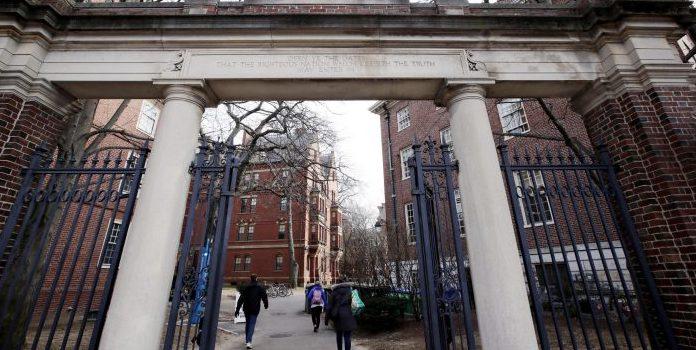(Headline USA) Opening a new front in legal battles over college admissions, the U.S. Department of Education has launched a civil rights investigation into Harvard University’s policies on legacy admissions.
Top colleges’ preferential treatment of children of alumni, who are often white, has faced mounting scrutiny since the Supreme Court last month struck down the use of affirmative action as a tool to boost the presence of students of color.
On Monday, the department notified Lawyers for Civil Rights, a leftist lawfare group based in Boston, that it was investigating the group’s claim that the university “discriminates on the basis of race by using donor and legacy preferences in its undergraduate admissions process.”
An Education Department spokesperson confirmed its Office for Civil Rights opened an investigation at Harvard. The agency declined further comment.
However, White House press secretary Karine Jean-Pierre said President Joe Biden has “made clear that legacy admissions hold back our ability to build diverse student bodies.”
That belies his own personal use of influence-peddling to benefit his family members and others within the Biden sphere of influence.
Although Hunter Biden’s degrees from Georgetown and Yale univesities are actually considerably more prestigious than his father’s degrees from Syracuse and the University of Delaware, the younger Biden did appear to enjoy legacy admission at his father’s high school alma mater, Archmere Academy.
Joe Biden also used his pull as vice president to write letters of recommendation to Ivy-League schools for the children of Hunter’s Chinese business partners.
But other forms of elite “privilege” notwithstanding, the lawfare attack in question targets only the use of family connections to gain access to educational institutions and not one’s proximity to the president’s troubled son.
The complaint was filed earlier this month on behalf of black and Latino community groups in New England.
The group argued that students with legacy ties are up to seven times more likely to be admitted to Harvard, can make up nearly a third of a class and that about 70% are white. For the Class of 2019, about 28% of the class were legacies with a parent or other relative who went to Harvard.
“We are gratified that the Department of Education has acted swiftly to open this investigation,” the group said in an email statement.
“Harvard should follow the lead of a growing number of colleges and universities—including Amherst, MIT, Johns Hopkins, the University of California, and most recently Wesleyan—and voluntarily abandon these unfair and undeserved preferences.”
A spokesperson for Harvard on Tuesday said the university has been reviewing its admissions policies to ensure compliance with the law since the Supreme Court ruling on affirmative action.
“As this work continues, and moving forward, Harvard remains dedicated to opening doors to opportunity and to redoubling our efforts to encourage students from many different backgrounds to apply for admission,” the spokesperson said.
Ending legacy preferences is “one of many steps that Harvard and other universities can take to increase access, diversity, and equity in admissions,” said Jane Sujen Bock, a board member of the Coalition for a Diverse Harvard, which includes alumni, student and staff.
Last week, Wesleyan University in Connecticut announced that it would end its policy of giving preferential treatment in admissions to those whose families have historical ties to the school.
Wesleyan President Michael Roth said a student’s “legacy status” has played a negligible role in admissions, but would now be eliminated entirely.
In recent years, other schools—including Amherst College in Massachusetts, Carnegie Mellon University in Pennsylvania and Johns Hopkins University in Maryland—also have eliminated legacy admissions.
Legacy policies have been called into question after last month’s Supreme Court ruling banning affirmative action and any consideration of race in college admissions.
In a pair of cases brought by Asian-American students who were adversely affected by racist affirmative action policies, the court effectively overturned cases reaching back 45 years, forcing institutions of higher education to seek new ways to achieve so-called diversity.
Despite the efforts to achieve a democraphic “diversity” that does not mirror the broader U.S. population, however, schools’ increasingly leftist sentiments have reflected a waning degree of ideological diversity.
This coincides with a recent poll showing that public confidence in universities has hit an all-time low.
NAACP President and CEO Derrick Johnson said he commended the Education Department for taking steps to ensure the higher education system “works for every American, not just a privileged few.”
“Every talented and qualified student deserves an opportunity to attend the college of their choice,” he said. “Affirmative Action existed to support that notion. Legacy admissions exists to undermine it.”
Sarah Hinger, senior staff attorney for the ACLU’s Racial Justice Program, said she did not know the specifics of the Harvard program but “as a general matter, legacy admissions tend to benefit disproportionately, white people and wealthy people.”
“Systemic racism and inequality has allowed some people to build legacies across generations of their family in the same way that systemic racism has left many families of color out of opportunities in the educational hierarchy,” she claimed. “In a way they’re two sides of the same coin.”
Leftist rhetoric however, has often conflated racial identity politics with Marxist class struggles in order to dupe blacks and Latinos into helping wealthy elites maintain the status quo by scapegoating their white middle-class counterparts rather than the true perpetrators of systemic inequality.
A study led by Harvard and Brown researchers, published Monday, found that wealthy students were twice as likely to be admitted to elite schools compared to their lower- or middle-income counterparts who have similar standardized test scores.
The study looked at family income and admissions data at Ivy League schools as well as Stanford, MIT, Duke and the University of Chicago. It found that legacy admissions policies were a contributing factor to the advantage high-income students have at these schools.
Athletic recruitment and extracurricular credentials, which are stronger when students attend affluent private high schools, were the other two factors.
Adapted from reporting by the Associated Press

